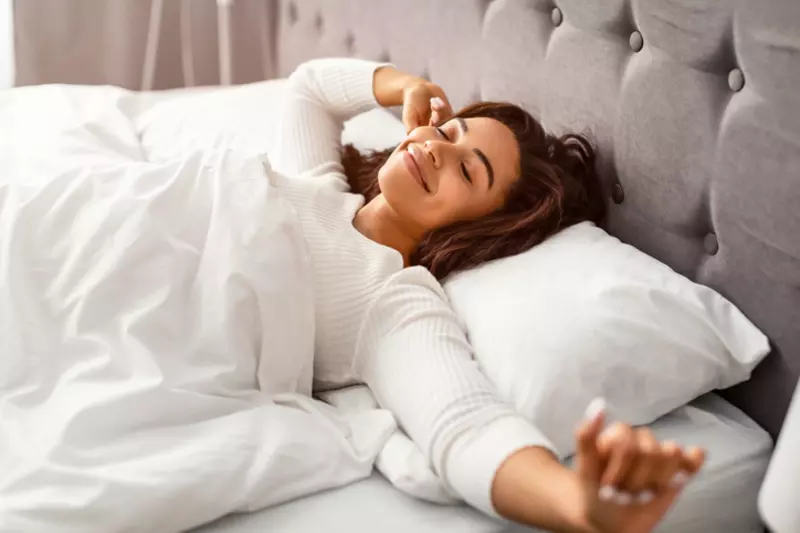- Lisa Markley

Whole-person integrative medicine focused on healing you in mind, body and spirit. It's more than fixing what’s wrong. It’s about celebrating what’s right and making sure you’re on the path to a healthier, stronger you.
Getting a good night's sleep on a regular basis can seem like a dream, especially in the fast-paced world we live in. But prioritizing and getting good sleep is so important for your health. Quality sleep on a routine basis improves your brain performance and mood, repairs tissue and muscle, drains toxins, and so much more. Sleep is an essential part of every process in the body and without it you are at an increased risk of developing different diseases or health conditions, ranging anywhere from heart disease to dementia. While everyone is different in the amount of sleep they need, the majority of adults need between seven and nine hours each night. It is important to make sure you are getting quality sleep and stick to a sleep schedule. Nutrition has a huge impact on sleep, and understanding which nutritional factors may affect you will help improve your sleep as well as your eating habits. Below are seven nutrition tips for better sleep.
Don’t eat a large meal late in the evening and don’t go to bed too full. Depending on the meal, it may take anywhere from two to four hours for your meal to leave your stomach. Eating too much too late at night may cause indigestion that makes it difficult for your body to get comfortable when you climb into bed. Late night eating may also affect the body’s natural release of melatonin, a key sleep hormone that relaxes your brain. If you do end up eating a larger meal, try to take a short walk after dinner to help aid in digestion.
- Don’t go to bed too hungry. On the flip side, it’s important to make sure you have a well-balanced dinner that will nourish and sustain you while you sleep. It’s not uncommon for people to wake up in the middle of the night due to their blood sugar levels dropping. If this is happening to you, you may want to try having a light snack an hour or two before bed. Some good snack ideas include: hummus and vegetables, celery sticks or apple slices with peanut butter or almond butter, ½ avocado with strawberries or blueberries or drizzled with lemon juice and olive oil, or a handful of nuts or seeds. Here are some quick recipes you can utilize as a bedtime snack.
Avoid consuming caffeine after 12pm. Caffeine keeps your nervous system stimulated long after the energy boosting effects wear off. Caffeine/coffee may also trigger heartburn, making it more uncomfortable to get your rest. Food sources of caffeine include coffee, black tea, green tea, chocolate, energy drinks and pre-workout supplements. Opt for water, herbal tea, decaf green or black tea, or decaf coffee later in the day.
To learn more about how caffeine affects your body, check out our blog post about caffeine.
Drink a cup of chamomile, passionflower or lavender tea one to two hours before your bedtime. These herbs aid in relaxing the body and are a nice nightly ritual that may help you get in the habit of winding down. You can enjoy it hot or make into iced tea.
Magnesium is a mineral that is known to improve relaxation and enhance sleep quality. Talk to your provider to determine if taking a magnesium supplement would be right for you. Food sources of magnesium include dark leafy greens (spinach, kale, Swiss chard, broccoli), beans (black beans, garbanzo beans, hummus, etc.), nuts and seeds. You could also enjoy a nice Epsom salt bath with a few drops of pure essential lavender oil – the magnesium will soak into your skin and help relax your muscles. If you have restless leg syndrome or get leg cramps in the middle of the night, consider rubbing magnesium oil into your legs to help them relax. It’s also great for a stiff neck and tight shoulders. Life-Flo brand magnesium spray oil can be found at most natural food stores in the supplement department.
Improve your sleeping environment. Listen to a meditation or calming music. Insight Timer, Calm, and others provide meditations you can listen to before bed to help you wind down. Adjust the temperature of your room or the type of bedding you have to improve your level of comfort. Turn off screens/blue light exposure at least an hour before bed.
- Get evaluated for sleep apnea. Sleep apnea is a disorder that causes you to stop breathing while asleep, leading to disruption of restful, healthy sleep. It can be caused by blockage of your airway or brain not controlling breathing correctly. Sleep apnea can cause daytime sleepiness and deplete people of the energy they need to maintain a healthy body weight. And research shows that people who effectively manage their sleep apnea may find it easier to lose weight.
If you find yourself struggling with sleep or need support in making better sleep or nutrition choices, call 913-632-3550 to make an appointment at the Whole Health Institute. We always look forward to working with you!



